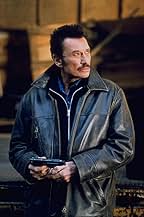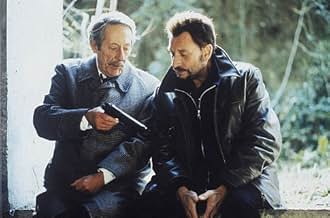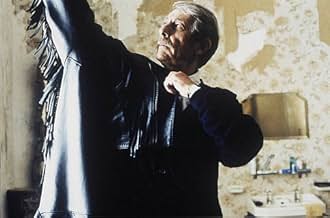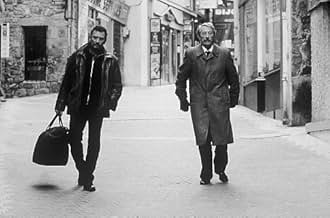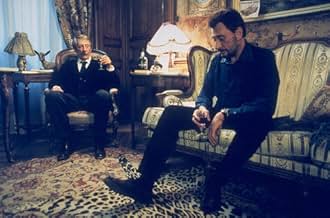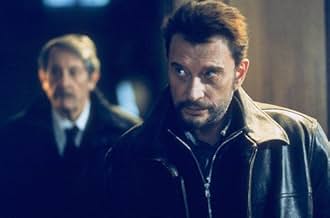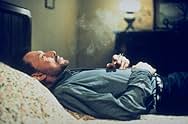CALIFICACIÓN DE IMDb
7.1/10
7.7 k
TU CALIFICACIÓN
Un ladrón de bancos llega para trabajar en un pequeño pueblo francés y entabla amistad con un profesor de poesía jubilado.Un ladrón de bancos llega para trabajar en un pequeño pueblo francés y entabla amistad con un profesor de poesía jubilado.Un ladrón de bancos llega para trabajar en un pequeño pueblo francés y entabla amistad con un profesor de poesía jubilado.
- Dirección
- Guionista
- Elenco
- Premios
- 8 premios ganados y 10 nominaciones en total
- Dirección
- Guionista
- Todo el elenco y el equipo
- Producción, taquilla y más en IMDbPro
Opiniones destacadas
This is a beautifully acted and written story of two older men dealing with regret. The dialogue is witty, but never self-conscious and the performances are great. Johnny Hallyday (The Elvis of France!) is especially surprising in his role as the bank robber at the end of his career.
The story is well paced, and unlike a lot of French movies, it's not just a bunch of talking heads, but a real story with compelling characters. The two strangers meet by hazard and forge a close relationship, each trading bits and pieces of their lives. The scene where Jean Roquefort gives Johnny his slippers is a literal manifestation of their efforts to change their lives, albeit late in life.
A lovely little film from beginning to end!
The story is well paced, and unlike a lot of French movies, it's not just a bunch of talking heads, but a real story with compelling characters. The two strangers meet by hazard and forge a close relationship, each trading bits and pieces of their lives. The scene where Jean Roquefort gives Johnny his slippers is a literal manifestation of their efforts to change their lives, albeit late in life.
A lovely little film from beginning to end!
"Man on the train", directed by Patrice Leconte is "intimiste" French cinema at its best. It tells the story of a chance encounter and ensuing friendship between Milan, a gangster who is coming to a small French town to rob a bank and Manesquier, a retired professor of poetry who has lived there his whole life. The two protagonists could not be more different and yet, each one becomes fascinated by the other's life. Soon, Milan tries on slippers and Manesquier is shooting a gun at soda cans. Was Milan's life wasted because he never had the strength to fill his life with the structure he so desires? Was Manesquier's life wasted because he never had the strength to escape the structured life he so loathes? Will they go all the way and actually exchange lives? The movie is extremely well directed and photographed, with grainy blueish colors that support each character's melancholy. The script is tight and leaves room for silent moments which are as important to the story as the dialogue (a concept unknown in Hollywood). Every word has a deeper meaning than its litteral one. In one of the best scenes of the movie, the elegant poetry professor Manesquier puts on Milan's leather jacket and stands in front of the mirror saying in English: "The name is Earp...Wyatt Earp". But in the end, what makes the movie such a gem is the talent of the two lead actors who, like their characters, are such extreme opposites that their screen relationship could easily have ended up devoid of any chemestry. Jean Rochefort is an intellectual and one of France's greatest and most subtle living actors. Johnny Hallyday is the uneducated, over-the-top rock'n roll singer and social icon who has monopolized the #1 spot in French music charts since 1960 and who has been derided by the French intelligentsia ever since. Until the movie, Rochefort himself was no fan of Hallyday, though he likes to say with a grin: "Madame Rochefort, on the other hand...". They have since become friends. It, reportedly, took a lot of effort by Rochefort and Leconte to make Hallyday comfortable enough to act opposite Rochefort whom he saw as a towering icon. They most certainly succeeded since, in the end, it is the surprising subtelty of Hallyday's performance that makes the movie so poignant. Despite the botox injections and the face lifts, his Mount Rushmore face looks like that of a man who has been to hell and back a few hundred times. He has such presence and charisma that you can't take your eyes off him whenever he appears on the screen. Though he plays Milan with a minimalist approach, both in demeanor and delivery, he manages to display the most intense emotions in a simple grin, a gesture or a stare. The way he smokes Manesquier's pipe while explaining Balzac's "Eugenie Grandet" (which he has obviously never read) to a private student of Manesquier will make you chuckle. The way he looks at Manesquier when he leaves his house at the end of the movie will simply break your heart... "Man on the train" is a gentle, tender film which asks big questions in little ways. Let's pray it never gets remade in Hollywood...
"Man on the Train (L'Homme du train)" is a small story of cumulative details done exceedingly well that could simply not be done by Hollywood.
The excellent leads, each charismatic in his own way, talky Jean Rochefort and taciturn Johnny Hallyday (who brings none of his pop star baggage to an American audience), are past middle age. There is a lot of Rohmer-like sitting around talking over a bottle of wine.
The emphasis is on very gradual, internal realizations by each character that are revealed by a subtle accretion of surprising little decisions, such as wearing slippers or getting a new haircut, culminating in an unpredictable, yet beautifully satisfying conclusion.
Photographed in a shades of gray palette that is almost in black-and-white, a small town and its interconnections and personalities are beautifully evoked.
The women in their lives are ancillary, which is just as well, as they are not completely believable.
The poetry teacher is too sophisticated to quote John Greenleaf Whittier, but I will, on the theme: "Of all the words of tongue or pen/the saddest are these/It might have been."
The excellent leads, each charismatic in his own way, talky Jean Rochefort and taciturn Johnny Hallyday (who brings none of his pop star baggage to an American audience), are past middle age. There is a lot of Rohmer-like sitting around talking over a bottle of wine.
The emphasis is on very gradual, internal realizations by each character that are revealed by a subtle accretion of surprising little decisions, such as wearing slippers or getting a new haircut, culminating in an unpredictable, yet beautifully satisfying conclusion.
Photographed in a shades of gray palette that is almost in black-and-white, a small town and its interconnections and personalities are beautifully evoked.
The women in their lives are ancillary, which is just as well, as they are not completely believable.
The poetry teacher is too sophisticated to quote John Greenleaf Whittier, but I will, on the theme: "Of all the words of tongue or pen/the saddest are these/It might have been."
We know this film from childhood, but the child has grown. Here we are in a provincial French city when the cowboy rides in on the iron train to transform the life of a citizen, unexpectedly, profoundly.
Jean Rochefort, with his great face of character, about to go for major surgery, a three vessel bypass, a wifeless man of regrets, a retired teacher of literature to secondary students, is about to meet his fantasy: Johnny Hollyday (the Elvis of France?) who plays a bank robber about to perform his retirement job. Meeting by apparent chance, though clearly pre-ordained, the fantasies of the lonely, anxious teacher whose love of poetry might be his most tender trait in an otherwise ruthlessly real view of the world, are set in motion. Hollyday becomes his unexpected guest...the lone hotel is closed for the season...and an excitement comes to Rochefort's life. The man has guns. There is a picture of him looking terribly western in his leather jacket, the enigmatic stranger/cowboy in the mythos of his host. Ah, to be that man, to fire that gun, to live that life of dark adventure.
It goes on to its meaningful end, not told here except to say that the last scene may be an error, a prolongation that was unnecessary and added nothing to the power of the film, nor detracted from the marvelous performance of Rochefort, who can do no wrong with any role, or Hollyday, whose acting turn here is perfect in the Robert Mitchum noir sense, but tinged with an old-world tiredness that is quite moving. All this with fine subsidiary acting, a perfectly murky Simenonoish setting, and Schubert's melancholic sounds. Ah, bon. Tres, tres bon.
Jean Rochefort, with his great face of character, about to go for major surgery, a three vessel bypass, a wifeless man of regrets, a retired teacher of literature to secondary students, is about to meet his fantasy: Johnny Hollyday (the Elvis of France?) who plays a bank robber about to perform his retirement job. Meeting by apparent chance, though clearly pre-ordained, the fantasies of the lonely, anxious teacher whose love of poetry might be his most tender trait in an otherwise ruthlessly real view of the world, are set in motion. Hollyday becomes his unexpected guest...the lone hotel is closed for the season...and an excitement comes to Rochefort's life. The man has guns. There is a picture of him looking terribly western in his leather jacket, the enigmatic stranger/cowboy in the mythos of his host. Ah, to be that man, to fire that gun, to live that life of dark adventure.
It goes on to its meaningful end, not told here except to say that the last scene may be an error, a prolongation that was unnecessary and added nothing to the power of the film, nor detracted from the marvelous performance of Rochefort, who can do no wrong with any role, or Hollyday, whose acting turn here is perfect in the Robert Mitchum noir sense, but tinged with an old-world tiredness that is quite moving. All this with fine subsidiary acting, a perfectly murky Simenonoish setting, and Schubert's melancholic sounds. Ah, bon. Tres, tres bon.
1st watched 8/9/2003 - 7 out of 10(Dir-Patrice Leconte): Wonderful drama about two men who want to switch places in life because each is bored of what their life has become. One is a bank robber, and the other is a retired poetry teacher. The bank robber is plain tired of the excitement and the other wants excitement in his life. The retired poetry teacher also has an upcoming triple-bypass heart surgery that lends to his aggressiveness about trying out the other lifestyle. Like many French dramas, this movie takes it's time and explores the characters and let's us get to know them. This is `so' lacking in most American films these days and therefore this is a breath of fresh air for those who are okay with reading subtitles. While watching this movie you get the feeling that you're watching two `real' people interacting despite their differences. Do they ever switch places? Well, sort of but like other French dramas `reality' is where the film stays for the most part. The ability for the characters to understand and accept each other is `just' wonderful and makes a wonderful statement about how we should `all' interact and I think this is what makes this film remarkable.
¿Sabías que…?
- TriviaJean Rochefort died in October 2017. Two months later, Johnny Hallyday died.
- ConexionesReferenced in 69 minutes sans chichis: Johnny Hallyday (2015)
- Bandas sonorasImpromptu in A-flat Major, Op. 142 No. 2 (D. 935)
Written by Franz Schubert
Selecciones populares
Inicia sesión para calificar y agrega a la lista de videos para obtener recomendaciones personalizadas
- How long is Man on the Train?Con tecnología de Alexa
Detalles
- Fecha de lanzamiento
- Países de origen
- Sitio oficial
- Idioma
- También se conoce como
- Man on the Train
- Locaciones de filmación
- Productoras
- Ver más créditos de la compañía en IMDbPro
Taquilla
- Total en EE. UU. y Canadá
- USD 2,542,020
- Fin de semana de estreno en EE. UU. y Canadá
- USD 41,138
- 11 may 2003
- Total a nivel mundial
- USD 7,727,906
- Tiempo de ejecución
- 1h 30min(90 min)
- Color
- Mezcla de sonido
- Relación de aspecto
- 2.35 : 1
Contribuir a esta página
Sugiere una edición o agrega el contenido que falta


